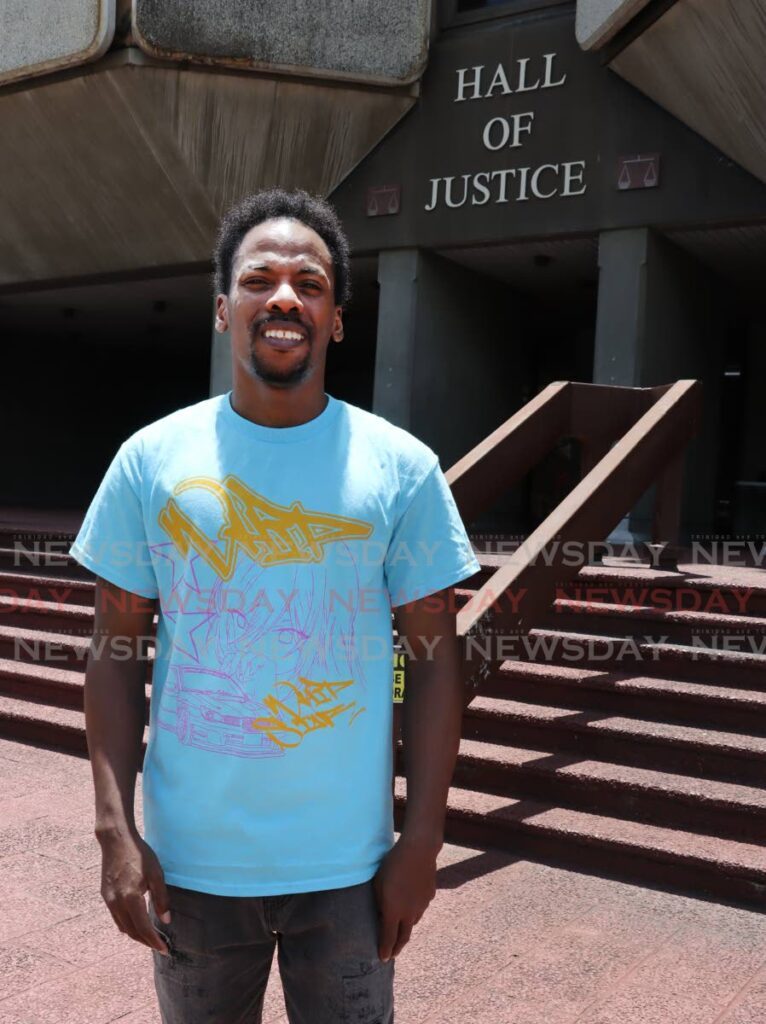Ex-murder accused rebuilds life brick by brick

No one ever expected them to succeed. Many people were sure they would end up back behind bars.
Sunday Newsday tracks the progress of eight men who won their cases or got out on bail. Their lives outside prison are featured in a series on inmates from Debbie Jacob’s CXC English classes and debate teams.
Why did these men make it when so many others failed?
Read their stories of redemption, rehabilitation and reinvention in the Sunday Newsday.
Part III
Debbie Jacob
“You have to be really strong to come out of prison with a positive mindset,” said Donnell Inniss.
In Port of Spain Prison, Inniss, with dreadlocks, had the stature of Bob Marley. He didn’t sing, but his voice had power.
Inniss loomed large in prison, earning the respect of inmates and prison officers for keeping the peace. A superintendent once said people from certain hotspots called the prison for Inniss to quell volatile situations. From the superintendent’s office, Inniss negotiated peace.
Charged with murder on September 23, 2009, when he was 23, Inniss, originally of East Port of Spain, spent nearly 14 years in prison before he won his case.
He was found not guilty on April 21 but released from prison on May 2, after a related gun charge was discontinued.
When he returned home, he noticed what inmates faced when resuming their lives.
“Imagine you coming out of prison after at least 12 years. You think about how things were when you went inside and what you are going to do when you go home.
"You have a mindset about what you’re going to meet, but now little children are disrespecting you. People might look to rob you. A child you knew might pull a gun on you. Nothing is the way you imagined.
"It’s difficult to get freedom only to return home to misery.”
He said there is no doubt that people who want you to go the wrong way will cross paths with you.
“But you have to know how to deal with them or work around them. The key is knowing you have to change to meet the climate. There are always people trying to force your hand in certain situations.”
He noted that the outcome of being in prison is unpredictable.
“There are people who come out of prison and really change, but the past might catch up with them. There are some people who come out with a nastier frame of mind.”
In prison, Inniss was the voice of reason. His steady, firm but soothing voice had the power to calm anyone out of control – even me, when I experienced two earthquakes during English classes I was teaching at the prison.
When men returned from court emotional and uncontrollable, Inniss helped them. In class, students said, “Donnell, go and handle that,” and in less than a minute, the prison grew silent.
“It just requires communication and honesty; being real and showing someone the reality. You have to break down information to someone’s level or rise to their level of understanding. Put yourself in their shoes. It’s not just telling them what they want to hear, but putting them in their zone.”
He said the strength to survive inside and outside of prison can only come from within.

“If you’re looking for some external force to steady you and set you right, it won’t happen. Most important to know is that survival depends on being humble.”
Inniss believes everyone creates the vibe they live by. That’s why he spends every Saturday fasting and praying three or four times a day.
“I don’t follow any one religion. I just go by the Bible. I believe everybody is godly."
His goal is to live a simple, peaceful life.
“The plan is to work and try to keep up with the liberty I have.”
He lives in an apartment and is building his own house.
“Every paycheque I buy some bricks, put a little money in the bank and save. By next year, I hope to have my place built.” He has relocated to a community in north Trinidad where he plans to live.
But Inniss is in no rush. Prison taught him patience.
“I have to eat and drink, so it takes time to get material to build my place and move forward. I’m coping. I’m making it. It’s a lot cheaper to live outside here than to live in prison, where the cost of anything is high.”
When Inniss was in prison, a small piece of macaroni pie cooked on the side by an inmate working in the kitchen cost $25. Cigarettes cost five times as much as outside.
“The price could rise if cigarettes were scarce because of increased security. It could go up to $200 for a cigarette. It’s an addiction. People will pay.”
Family members handled those payments with cash or phone cards.
Inniss has returned to his trade as a plumber. Before prison, he found the wages from plumbing too paltry. Now he appreciates having a trade to fall back on, and a girlfriend who understands him.
“I’m lucky. I can make it. There is only me, and my girlfriend works too. I have one child, grown now. I don’t really have it that hard financially.
"But you must put yourself in people’s shoes. You know you will do anything for your children, and if you’re poor, and you have to do something bad to get the money to take care of your children, you’ll do it.”
He avoids thinking about the years spent in hot cells inside Port of Spain Prison with no running water or toilets, in cells always smelling of urine and faeces swept into open drains.
“I try to blank out any memories of being inside and move forward out here. I hardly talk about being in there. I put it behind me. To make it here in the ‘free world,’ you have to put it out of your mind. Then you don’t have to deal with it. Thinking about prison would be a stumbling block.”
Most former inmates complain about having no job opportunities after prison, but Inniss said, “There is work. Some of the jobs are underpaying. You need a skill to survive. That’s better than depending on someone to give you a job, and you feel more independent.”
He said one of the biggest challenges of coming out of prison is fighting bitterness and anger.
“That is my challenge too. I’m human. Now and again someone might do something to get me vex. But I’m not a person to get angry too much. I learned to be humble over the years.
“For a man who is not humble, little things can cause big problems. Other than my education, the best thing I got from prison is learning how to be humble.
"Bitterness and anger is a different energy. It feeds on itself. You can slip any time if you have that.”
He believes the way to counteract negative feelings is to understand everything in life has a purpose.
“Feeling a lack of control in a situation causes problems. In prison, if a family member dies, you feel rage, but if you know things have to happen; this is life and you can’t control it, then you can accept it. You’re human. You will feel the pain, but it’s how you will take it. If you take it as a surprise, rather than understand it, you open yourself to bitterness and anger.”
Inniss said in every aspect of life there is good and bad, and that goes for people too. It’s important to avoid stereotyping and unrealistic expectations.
“I watch people as people. It doesn’t matter if you’re a bad boy, a police, a vagrant or someone in prison. Everyone deserves a chance. Understanding a person is key. You can’t put a fish in a bowl of water and expect it to run. It can only swim.
"You have to remember, this is life. It’s up to you to be happy and take it with a smile.”

Comments
"Ex-murder accused rebuilds life brick by brick"